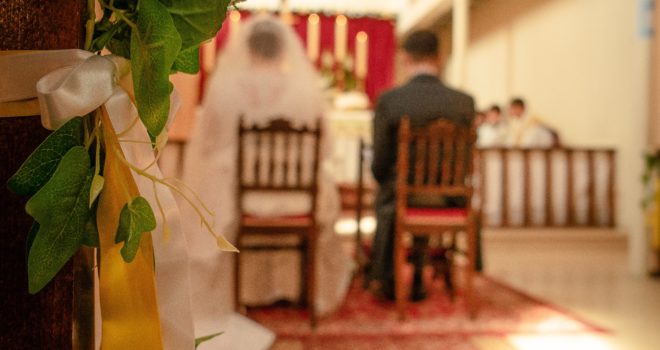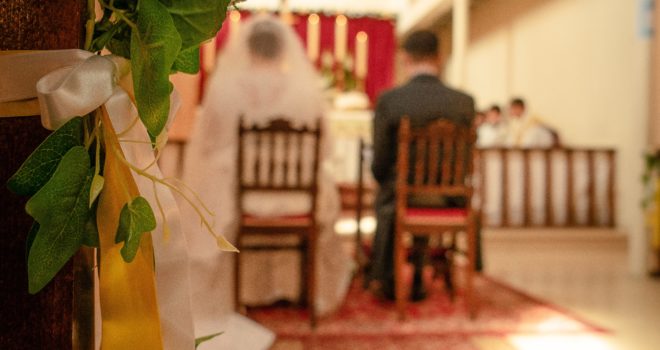Be subordinate to one another out of reverence for Christ.
Wives should be subordinate to their husbands as to the Lord.
For the husband is head of his wife just as Christ is head of the church, he himself the savior of the body.
As the church is subordinate to Christ, so wives should be subordinate to their husbands in everything.
Husbands, love your wives, even as Christ loved the church and handed himself over for her
to sanctify her, cleansing her by the bath of water with the word,
that he might present to himself the church in splendor, without spot or wrinkle or any such thing, that she might be holy and without blemish.
So [also] husbands should love their wives as their own bodies. He who loves his wife loves himself.-Ephesians 5: 21-28
As a little girl, I often envisioned my wedding day as a romantic idyll, replete with delicate lace, a long train on a traditional gown, and abundant fresh flowers. Naturally, I did not reflect beyond this point, on whether I might become a virtuous wife, or even what a virtuous wife was.
Each of us adopts an understanding of who men and women are, based largely on the environment in which we were raised, as well as the cultural milieu in which we experienced our coming of age. For me, it was a subconscious awareness that I needed a man in order to fully be a woman, that a man would “complete” me, and I him.
Womanhood was presented to me in the typical fashion of the 1980s, although I received my education by way of my teachers’ interpretation of Mary, Mother of God. As a first grader, I learned that Mary was soft-spoken, timorous, and agreeable; these were adjectives to describe her meekness.
So I came home from school, stared at the holy card with the angelic image of Mary, and tucked it underneath a pile of books or papers, where I would not be reminded of my lack of womanly virtue.
I was often admonished for my outspoken views, my impassioned pleas against what I saw as injustices, my innate need for independence. “That’s not ladylike” was often the outcry, and I was shushed. Often, I hung my head in shame and internalized the message that I was not a real woman and never could be, because I did not have the “right” personality to be.
Only recently did I hear a homily that granted me new insight. Like many women, I have always cringed at the words, “Wives, be submissive to your husbands.” It sounds reminiscent of the language used to explain how women should be, and how I never was: quiet and compliant, always cheerful and smiling and laidback.
But our pastor, Fr. Mark, explained that the word submissive literally means to be “under the mission” of someone, in this case, one’s husband. But the husband must first be under the mission of God, which means the wife is called to assist her husband in this as one mind and heart – together, as partners.
Equally revealing, I learned from Mary Kloska’s book, The Holiness of Womanhood, that women were created by God for two main tasks: to be a helpmate and to be a gift. We know about the helpmate aspect, which tends to include marriage. Yet being a helpmate in a broader sense is about the spirituality of mothering, the call to nurture and serve others through the heart language. This is one of the great blessings of womanhood.
The other, to be a gift, means that we must first receive before we can give. I found this to be crucial, particularly prophetic in this day and age, as well, because women are not usually thinking they need to receive before they give. We view this as selfishness, likely because the idea of self-care tends to be more about indulgence than nourishing one’s mind, body, and soul.
What, or rather, Whom, do we first receive, in order that we might fully live under the mission of God for our marriage? In order to submit to our husbands, too? Of course, we receive God – His grace, His love, His healing. This is obtained when we open our hearts on a daily basis in the way Mary lived, “pondering these things” in our hearts.
Women must first receive the gifts God wishes to grant her before she can give of herself.
We can’t begin our days with the fallacy that we control how everything will unfold, who will manage what, how much will be accomplished. At least, we cannot do this without first turning to God, who fills us with Himself and better equips us to be godly women who truly, humbly, live under the mission of our husbands.
As for Mary, I learned from a wise friend that she is the perfect embodiment of every good thing, every virtue in every person. She does exemplify meekness, but not as mousiness. Meekness is, in fact, both tender and mighty. Her heart was ablaze with depth and mystery, just as mine is. Just as many women’s hearts are.
✠
Photo by Michel Grolet on Unsplash














